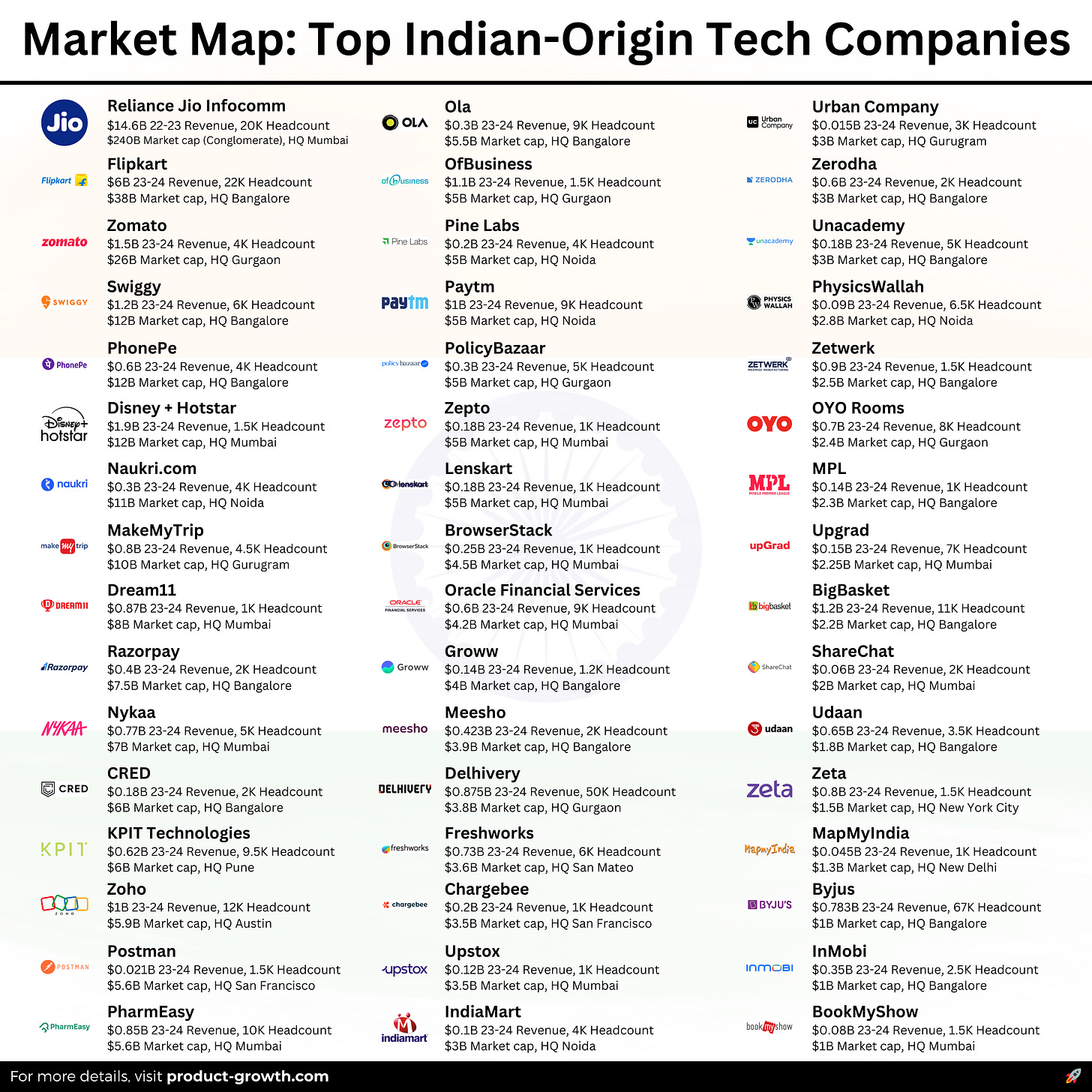The Definitive Market Guide to Indian-Origin Tech Companies
Which Indian Tech Companies are the leaders? There's been no comprehensive market analysis. So here it is: the top companies by revenue, market cap, headcount, efficiency, and more.
The Indian technology market has been on fire. Outside of the US and China, it’s firmly established itself as the #3 most interesting tech market in the world.
Despite this, there are absolutely no good sources on this tech market. I would’ve thought a VC, or an investment analyst, or a research firm would’ve covered this.
But there are just no good results on Google. Everything is about Indian-origin CEOs:
Even if you’re not in India, as the third biggest tech market, it’s worth having better resources.
So - I decided to fill the gap.
Introducing Malthi
I partnered with one of the longest tenured PM leaders in India to get you the full breakdown:
Malthi is Fractional Chief Product Officer at HerKey and Visiting Faculty for Product Management at IIM Udaipur. She has also worked as a PM at PayPal, Societe Generale GSC, Intuit, SAP and EMC. If anyone knows the Indian market, it’s Malthi.
Today’s Post
Words: 10,384 | Est. Reading Time: 48 mins
It’s the web’s deepest and most authoritative guide on Indian Tech:
The Top 48 Indian-Origin Tech Companies
What Industries are Doing Best in India
Leaders in Efficiency
Deep Dives: The 10 Biggest
Companies that are Struggling and Why
1. The Top 48 Indian-Origin Tech Companies
We scoured the internet for the top 48 companies by valuation and market cap. Here they are:
Some names on there you probably didn’t know, huh?
Most of us have heard of Reliance Jio Infocomm, by far the largest indian tech conglomerate out there. (There’s also Tata Digital, who we’ve excluded here.)
But it’s surprising to see names like KPIT Technologies (large presence in Germany) and Zeta (large presence in the US) as well. Indian-origin tech companies aren’t restricting their presence to India. They’re going global.
(The companies who were close to making this list, but just barely didn’t, were JustDial, Quickr, Polygon, and Nazara Technologies.)
Let’s take a look at the summary stats of the top companies:
Median market cap: $4.5B
26% Public Companies, 74% Private
24% Fintech, 18% E-commerce, 14% SaaS
32% HQ Bangalore, 24% Mumbai, 12% Gurgaon
22% B2B, 50% B2B2C, 12% B2C
Let’s double click into those industries - because it’s very surprising.
2. What Industries are doing the best in India
While headlines might lead you to believe that food delivery or internet streaming are dominating the Indian tech landscape, a closer look at the top 50 companies reveals a different story.
The top 4 industries shaping India's tech future are:
Fintech
E-Commerce
SaaS
EdTech
Let’s deep dive into each one.
Top Industry - FinTech
24% of top companies
Total market cap: $62B
FinTech stands out as by far the dominant force in the Indian tech ecosystem, with 12 out of the top 50 companies.
In the US and other markets, Fintech might be struggling. But not in India.
The government's push with initiatives like UPI has been the catalyst. It's created an ecosystem where digital payments are as common as chai stalls in a busy Indian market.
Two standout companies in this sector are:
PhonePe, which processed a staggering 7 billion transactions in Q4 2023 - that's nearly one transaction for every person on the planet.
RazorPay, which now serves over 8 million businesses. The days of cash-only transactions and long queues at banks are becoming as rare as an empty road in Delhi during peak hours.
These companies’ rapid growth is akin to the pace of construction in India's major metros - constant, and transforming the landscape.
#2 Industry - E-commerce
18% of top companies
Total market cap: $300B
E-commerce emerges as the second-largest sector in the top 50 list. By market cap, it might even be the largest.
It’s clearly one of the most important sectors in Indian tech. The transformation in this space is as dramatic as the shift from landlines to smartphones in India.
Standout companies in this category include:
Flipkart: Not content with being the e-commerce leader, Flipkart is now venturing into quick commerce with Flipkart Minutes.
Meesho: This social commerce platform is revolutionizing how India shops online, especially in Tier 2 and 3 cities. Meesho's growth underscores a crucial aspect of India's e-commerce story - the rise of the next billion users.
The e-commerce sector's growth trajectory is steeper than the learning curve of a fresher in a tech startup.
#3 Industry - SaaS
12% of top companies
Total market cap: $24B
While FinTech and E-commerce are making waves, SaaS companies are the silent achievers of the Indian tech world.
Creating a global SaaS company has never been easier, and India clearly has the talent.
Companies like:
Zoho: This bootstrapped success story has become a global player, competing with tech giants. Zoho's journey from a small Chennai startup to a multinational corporation is as inspiring as India's space program achievements.
Freshworks: The first Indian SaaS company to go public on NASDAQ, Freshworks symbolizes the coming of age of India's SaaS sector. Its success is paving the way for other Indian SaaS startups, much like how Infosys's NASDAQ listing in 1999 heralded India's IT services boom.
The growth of these companies highlights a shift in India's tech narrative - from being the world's back office to becoming a product nation. This transition is as significant as India's economic liberalization in the 1990s.
#4 Industry - EdTech
8% of top companies
Total market cap: $9B
The EdTech sector in India is facing challenges, mirroring the complexities of India's education system itself.
Byju's, once the poster child of Indian EdTech, has seen its valuation drop from $22 billion to $1 billion, with scandal after scandal hitting the giant. This downturn is a stark reminder that in tech, as in education, sustainable growth trumps rapid expansion. It's a lesson as important as any taught in their courses.
However, the sector's potential remains vast:
Unacademy: Despite layoffs, Unacademy continues to innovate, expanding into offline learning centers. This hybrid approach could be the future of EdTech, blending the best of digital and traditional learning.
upGrad: Focusing on higher education and upskilling, upGrad is tapping into India's demographic dividend. Its growth underscores the critical need for continuous learning in a rapidly evolving job market.
The EdTech sector's challenges and potential mirror India's broader educational landscape - a mix of immense opportunities and systemic hurdles.
Emerging Sectors
While the top four industries dominate the landscape, emerging sectors are rapidly gaining ground, showcasing India's diverse tech ecosystem.
DeepTech and AI
Companies like MapMyIndia are leading the charge in this space:
MapMyIndia: With a market cap of $1.3 billion, this navigation and location-based SaaS company exemplifies how deep tech can solve uniquely Indian challenges. Its success, culminating in a 2021 IPO, shows the potential for AI and mapping technologies in a country as geographically diverse as India.
HealthTech
The health-tech sector is seeing significant growth, addressing India's healthcare accessibility challenges:
PharmEasy: Valued at $5.6 billion, PharmEasy has transformed medicine delivery in India. With over 1000 employees, it's tackling the critical issue of healthcare access, especially in non-metro areas.
1mg: Now part of Tata Digital, 1mg is another player revolutionizing healthcare delivery. While specific data isn't available, its acquisition by Tata underscores the potential seen in this sector by major conglomerates.
Gaming and Entertainment
This sector is capitalizing on India's young, tech-savvy population:
Dream11: With a valuation of $8 billion and 7100 employees, Dream11 has tapped into India's love for cricket, creating a fantasy sports giant. Its success highlights the potential of the Indian gaming market.
MPL: Valued at $2.3 billion, MPL represents the rise of mobile gaming in India. With 1000 employees, it's creating a significant impact in a short time since its 2018 founding.
BookMyShow: While more established (founded in 2007), BookMyShow, valued at $1 billion, continues to be a key player in India's entertainment tech scene.
B2B and Manufacturing Tech
An often overlooked but crucial sector:
Zetwerk: With a valuation of $2.5 billion and 1500 employees, Zetwerk is revolutionizing manufacturing and supply chains. Founded in 2018, its rapid growth underscores the potential in modernizing India's vast manufacturing sector.
Udaan: Valued at $1.8 billion, this B2B e-commerce platform is digitizing the massive unorganized retail sector in India. With 3500 employees, it's creating significant impact in a traditionally offline industry.
These emerging sectors are proving that there's more to Indian tech than just the usual suspects.
Now let’s go deeper on the companies themselves. Who leads in efficiency? How have the top giants grown? And who has stumbled?
Keep reading with a 7-day free trial
Subscribe to Product Growth to keep reading this post and get 7 days of free access to the full post archives.





